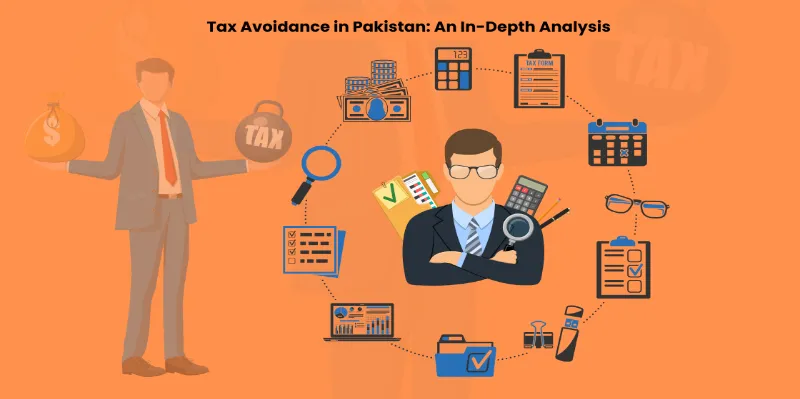
Tax avoidance and tax evasion are significant challenges that hinder Pakistan’s economic development. While tax avoidance involves legally exploiting loopholes to minimize tax liabilities, tax evasion constitutes illegal practices to escape tax obligations. In Pakistan, both practices have profound impacts on revenue collection and the overall economic landscape. Addressing these issues is crucial for sustainable growth and public service provision.
Table Of Content
- Understanding Tax Avoidance and Evasion
- Who is a Non-Filer?
- Key Differences Between Filers and Non-Filers
- How to Become a Filer in Pakistan
- The Impact of Filer and Non-Filer Status on Financial Transactions
- Recent Updates from FBR
- The Role of FBR in Promoting Tax Compliance
- The Benefits of Increasing the Number of Filers in Pakistan
- Challenges in Increasing the Number of Filers
- Reach Out For Expert Guidance!
Understanding Tax Avoidance and Evasion
Tax avoidance in Pakistan is a widespread issue. According to recent studies, only 1% of the population pays income tax, highlighting the complexity and lack of understanding surrounding the tax code. This complexity fosters a culture of tax avoidance, where individuals and businesses exploit legal loopholes to reduce their tax burden.
Tax evasion, on the other hand, involves illegal activities such as underreporting income and inflating expenses to avoid taxes. Both practices lead to significant revenue losses, affecting the government’s ability to fund essential services.
The Scope of Tax Evasion in Pakistan
Pakistan faces an annual tax compliance gap of approximately Rs5.8 trillion, which constitutes about 6.9% of the country's GDP. This gap underscores the magnitude of tax evasion across various sectors.
A detailed presentation delivered to Prime Minister Shehbaz Sharif and the Special Investment Facilitation Council (SIFC) highlighted the severity of the situation. In the fiscal year 2022-23, the smuggling of petroleum, oil, and lubricants (POL) products alone accounted for an estimated Rs996 billion in lost revenue. The illegal import of oil through Iran and other border areas was a key contributor to this shortfall.
Sector-wise Analysis of Tax Evasion
Tax evasion affects various sectors of the economy differently, each contributing to the overall tax gap in unique ways. Understanding these differences is crucial for implementing effective countermeasures.
- Petroleum, Oil, and Lubricants (POL)
- Rs996 billion lost due to smuggling
- Illegal imports through Iran and other border areas
- Retail Sector
- Rs888 billion in losses
- Transport Sector
- Rs562 billion in losses
- Independent Power Producers
- Rs498 billion in losses
- Smuggling-Prone Items
- Rs355 billion in losses
- Exports
- Rs342 billion in losses
- Real Estate
- Rs148 billion in losses
- Others
- Rs1.607 trillion in annual tax evasion
Sales tax evasion represents the largest portion of this gap, potentially reaching up to Rs2.9 trillion annually. Customs-related tax evasion, including under-invoicing and smuggling, is believed to be around Rs600 billion per year.
The Impact of Tax Avoidance and Evasion
Tax evasion significantly impedes human development in Pakistan, hindering the provision of essential public services such as education, healthcare, infrastructure, and social welfare. This exacerbates inequality, restricts access to services, perpetuates poverty, and obstructs progress towards the Sustainable Development Goals.
According to Dawn News, in 2021, in just 300 property transactions in Karachi, an excess of Rs13 billion was paid compared to the property valuation rates set by the Federal Board of Revenue (FBR), highlighting the prevalence of black money in the real estate sector.
Impact of Tax Evasion on Public Services in Pakistan:
| Public Service | Impact of Tax Evasion |
|---|---|
| Education | Reduced funding for schools, teacher salaries, and infrastructure |
| Healthcare | Limited access to healthcare facilities, shortage of medicines and medical equipment |
| Infrastructure | Delayed or halted development of roads, bridges, and public transportation |
| Social Welfare | Reduced support for vulnerable populations, including the elderly and disabled |
Drivers of Tax Avoidance in Pakistan
Several factors contribute to tax avoidance in Pakistan:
1. Complex Tax Code
- The complexity of the tax code makes it difficult for taxpayers to understand their obligations, leading to the exploitation of legal loopholes.
2. Cultural Acceptance
- There is a cultural acceptance of tax avoidance, where it is seen as a norm rather than an exception.
3. Lack of Trust in Government
- Many taxpayers lack trust in the government’s ability to utilize tax revenues effectively, leading to a reluctance to pay taxes.
4. Inadequate Penalties
- The penalties for tax evasion are often insufficient to deter non-compliance.
Ethical Considerations
The ethics of tax avoidance are debated. Some argue that it is ethical to use legal means to reduce tax liabilities, while others believe it is unethical as it deprives the government of the revenue needed for public services. The intent of the taxpayer and the impact on society are crucial factors in this ethical evaluation.
Strategies to Curb Tax Avoidance and Evasion
Addressing the issues of tax avoidance and evasion requires a multi-faceted approach. Here are some effective strategies:
1. Simplifying the Tax Code
- Simplifying the tax code would make it easier for taxpayers to understand their obligations and reduce opportunities for avoidance.
2. Increasing Penalties
- Increasing penalties for tax evasion would deter taxpayers from engaging in illegal activities.
3. Promoting Tax Compliance
- Creating a culture of tax compliance through education and awareness campaigns can encourage voluntary compliance.
4. Enhancing Enforcement Mechanisms
- Strengthening enforcement mechanisms to detect and punish tax evaders effectively.
5. Improving Trust in Government
- Demonstrating transparent and efficient use of tax revenues can build trust and encourage compliance.
Government Initiatives
The government of Pakistan is contemplating a comprehensive restructuring of the Federal Board of Revenue (FBR) and implementing several initiatives aimed at enhancing tax collection and compliance. These include separating Tax Policy Office functions, introducing digital invoicing, and enhancing collaboration with the National Database and Registration Authority (NADRA).
Impact on Specific Sectors
Tax evasion impacts specific sectors in unique ways, necessitating tailored solutions for each.
Real Estate
The real estate sector in Pakistan is notorious for tax evasion through practices such as under-invoicing and the use of black money. Properties are often undervalued in sale and purchase deeds to evade taxes. For example, in Karachi alone, discrepancies in property transactions revealed a significant amount of unreported funds, underscoring the prevalence of black money in the sector.
Automotive Sector
The automotive sector, including auto lubricants and tires, is also affected by tax evasion. Illegal imports and smuggling significantly impact this industry, leading to substantial revenue losses. The Ministry of Communications estimates that by 2030, there will be 65 million vehicles on the road in Pakistan, with a significant portion of the tire market being met by illegal or smuggled tires.
Pharmaceutical Industry
The pharmaceutical industry faces challenges with tax evasion due to smuggled and counterfeit medicines. This not only results in revenue losses but also poses significant health risks to the public. Stricter regulations and enforcement mechanisms are needed to combat this issue effectively.
Tea Industry
Pakistan, being one of the largest importers of tea, also suffers from tax evasion and illicit trade. Smuggling and illegal trade, particularly through the Afghanistan-Pakistan Transit Trade Agreement, exacerbate the problem. This not only affects revenue collection but also poses health risks due to adulteration and counterfeit products.
Cultural and Social Factors
Tax avoidance in Pakistan is deeply rooted in cultural and social factors. The perception of corruption, lack of transparency, and inefficiency in public services contribute to a low level of trust in the government. This, in turn, encourages tax avoidance behaviors among citizens.
The Role of Legislation
Legislative gaps and outdated land classification methods further complicate the issue of tax avoidance. The absence of a robust legal framework, especially in the real estate sector, has allowed tax evasion practices to flourish. For instance, until 2020, there was no legal framework for land valuation in the Islamabad Capital Territory, contributing to billions in tax evasion.
Psychological Factors
Psychological factors, such as the feeling of guilt and shame associated with tax evasion, play a significant role in influencing tax compliance. Studies suggest that individuals who perceive tax evasion as socially unacceptable are less likely to engage in such practices. Public awareness campaigns highlighting the moral and ethical implications of tax evasion can help foster a culture of tax compliance.
Technological Solutions
Implementing technological solutions, such as digital invoicing and enhanced data analytics, can significantly improve tax collection and compliance. These technologies can help identify discrepancies and detect fraudulent activities more efficiently. Collaboration with institutions like NADRA can further enhance the effectiveness of these solutions.
Reach Out For Expert Guidance!
Tax avoidance and evasion pose significant challenges to Pakistan’s economic stability and development. Addressing these issues requires a multi-faceted approach involving simplification of the tax code, increasing penalties, promoting tax compliance, and enhancing enforcement mechanisms. Building trust in the government’s use of tax revenues is also crucial. By taking these steps, Pakistan can improve its revenue collection, reduce its fiscal deficit, and ensure sustainable development for its citizens.
Contact our professionals for tax consultancy services today and get expert guidance on the complexities of taxes. Let us help you optimize your tax strategy and ensure compliance with the latest regulations.
Reach out to us now and contribute to an equitable tax system!
References
https://www.dawn.com/news/1815127


